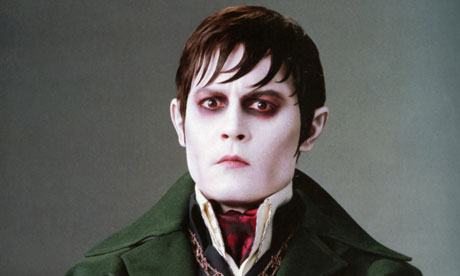
Last weekend, in defiance of the sunshine, I went to the movies. First, I saw a Tim Burton film starring Johnny Depp with white makeup and blackened hair playing a misunderstood loner (pictured). He is befriended by a middle-aged mother and, despite his apparent asexuality, he is romantically pursued by one of her friends. He is, however, besotted with a doe-eyed young lady, but their love is doomed because she, unlike him, is mortal. The movie climaxes with outraged townsfolk storming his gothic castle, horrified when they learn of his true nature.
After that, I decided some Wes Anderson was in order. This movie featured improbably eloquent children and focused on an especially precocious boy who is mocked by his peers and misunderstood by the adults, all of whom are emotionally damaged and less mature than the children. There are scenes involving over-the-top amateur dramatics. Bill Murray shambles about, playing a chain-smoking, embittered cuckold.
The idealists are probably thinking that I treated myself to a delightful double bill of Edward Scissorhands and Rushmore, easily two of the best films of the 1990s, from two of the then most excitingly distinctive directors to emerge from American cinema in quite some time. The cynics, however, will know 'twas not the case. Instead, I watched the latest films from Burton and Anderson – Dark Shadows and Moonrise Kingdom – two movies with weaknesses made only more obvious by the surface similarities with their far superior predecessors.
What happened to these directors? Two original voices have become not just derivative but self-derivative. Not that they're the only ones to suffer this fate. Last week, the trailer to Baz Luhrmann's The Great Gatsby was released and, having not seen the movie, it's impossible to say whether the film actually resembles Luhrmann's Romeo + Juliet as much as the trailer suggests (wild party, anachronistic music, doomed love, moody Leonardo DiCaprio), or if the studio just wants audiences to think it does. Sofia Coppola, once feted for her hipster moody style rehashed her reputation-making film Lost in Translation with her latest film Somewhere, this time starring Stephen Dorff, to coma-inducing effect.
Neither Dark Shadows nor Moonrise Kingdom is terrible. But they are predictable and both show Burton and Anderson pillaging their own catalogue to diminishing returns. (Suzy in Moonrise Kingdom is so similar to Margot Tenenbaum from The Royal Tenenbaums that the later film could be a prequel.) They take the stylised surface of their old films, yet forget the emotional wallop beneath that made Rushmore, Bottle Rocket and The Royal Tenenbaums (Anderson) and Edward Scissorhands, Ed Wood and Batman (Burton) so special. Burton's films have become more sentimental since his parents died, a point he conceded several years ago. But sentimentality is the opposite of emotional truth. Meanwhile, Anderson was presumably too busy Instagramming Moonrise Kingdom to give it any kind of depth.
Bill Murray is at risk of becoming to Anderson what Johnny Depp is to Burton, his once revelatory performances for that director ossifying into schtick as a comparison between his wonderful turn in Rushmore and his barely sketched one in Moonrise Kingdom proves. Similarly, the tenderness that Depp brought to Ed Wood has hardened into ham: in Dark Shadows he merely mashes up his Michael Jackson impression from Burton's disappointing Charlie and the Chocolate Factory and his Ichabod Crane from Burton's Sleepy Hollow. In his fantastic foreward to the 1994 book, Burton on Burton, Depp profusely thanks the director for rescuing him from his 80s career of being a "TV boy, heart-throb, teen idol, teen hunk. Plastered, postered, postured, patented, painted, plastic." But 20 years on, his performances are looking just as restricted.
Neither Anderson nor Burton suffers from laziness or a paucity of imagination; as Anderson's Fantastic Mr Fox and Burton's take on Sweeney Todd showed, both were apparently rejuvenated by working in a new genre (respectively, stop motion animation and musical). More likely, they are the product of a bloated but insecure studio system, one that gives successful film-makers as much money as they like – as long as they make exactly the same movies they made before. The 2009-10 exhibition of Tim Burton's drawings at New York's Museum of Modern Art was unedited and overindulgent and felt like a metaphor for too much of Burton's career.
A director can have a distinctive stamp without becoming repetitive. Woody Allen's consistent style, music and that familiar nebbishy Allen persona can give his films an all too-easy-to-parody feel. Yet the best Allen films are generally ones in which that persona is either relegated to the sidelines to give the more complex characters space (Hannah and her Sisters, Crimes and Misdemeanors), counterbalanced by an equally distinctive character (Annie Hall) or simply absent (The Purple Rose of Cairo).
In other words, while Allen stays true to his style, he does not – at his best – sacrifice it for substance. Anderson and Burton, however, who had seemed so expansive, have painted themselves into a twee and gothic corner, their movies once giving audiences the thrill of the new, now all too often provide only the comfort of deja vu.

